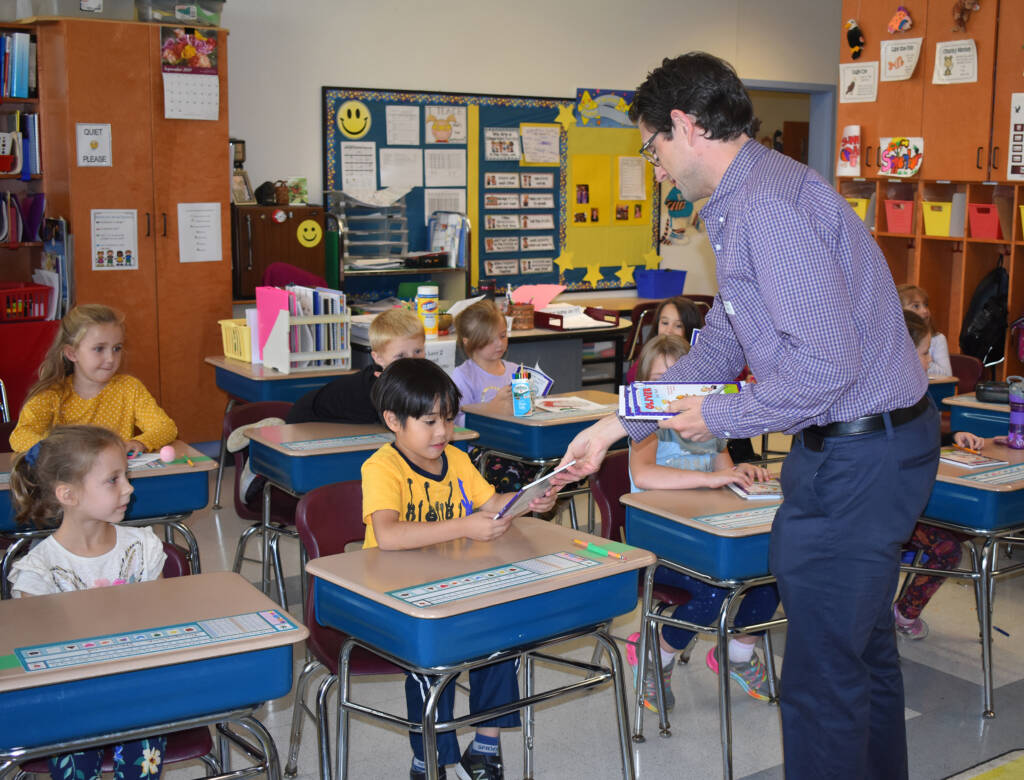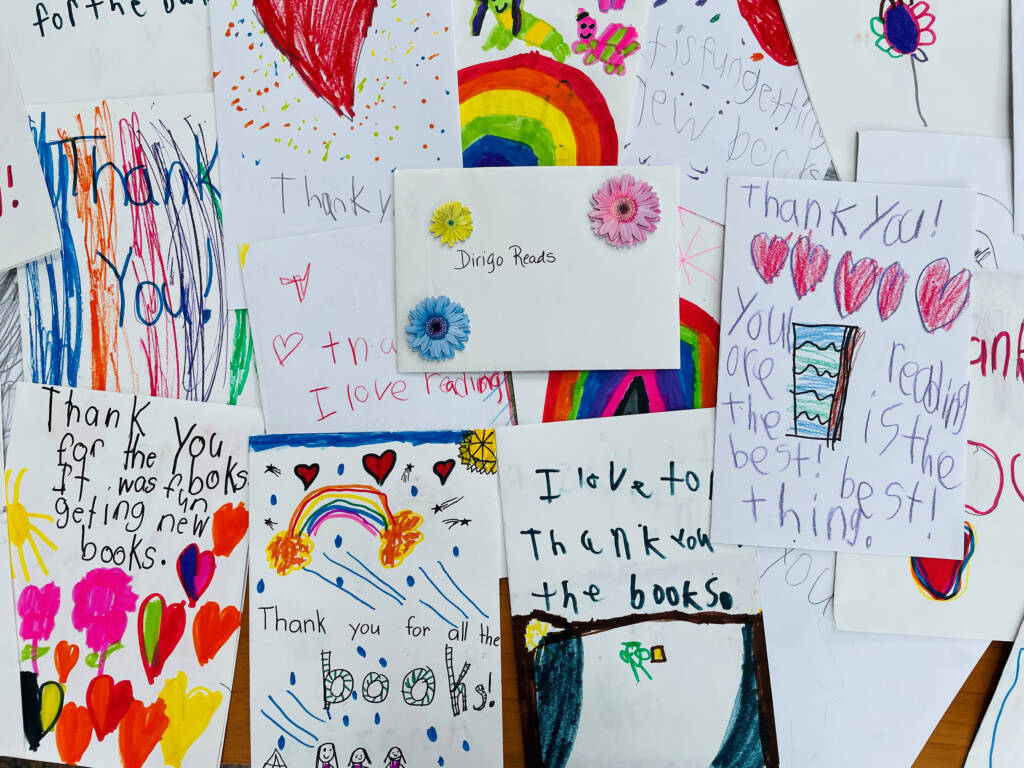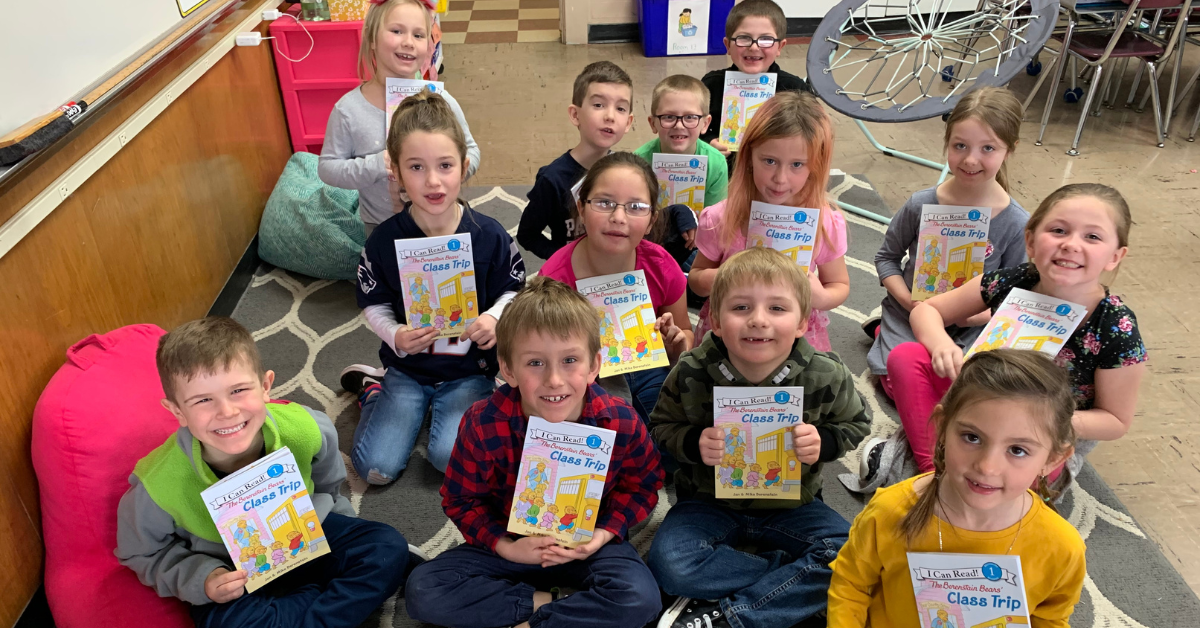By giving Maine first graders a new book every month of the school year, Dirigo Reads furthers literacy skills while encouraging students to fall in love with reading. Hannaford has supported this nonprofit organization through the Hannaford Helps Community Bag and Bloomin’ 4 Good Programs.
Tell us about Dirigo Reads.
Dirigo Read’s mission is to provide a new book to every first grader in every public school in Maine for every month of the school year by 2025. We were founded in 2019 and started with six schools, one in each of the counties surrounding our home county. At the time, the smallest school we served had two first grade students, and our largest school had 100.
During this pilot year, we wanted to see if we could do this and if it would be sustainable. We received overwhelmingly positive feedback from the schools, families, and teachers. Most importantly, we heard directly from the students through handwritten notes.
Now, our goal is to reach every first grader in the state sustainably by 2025. The pandemic slowed us down a bit, but we don’t plan on stopping until we’re able to serve everybody.
What services do you provide to the community?
We provide first graders in our program with a new book for every month of the school year. So, every first grader, regardless of income or geographic region, will receive a total of 10 books from September to June.
The reason we focus on providing books to this age group is because of the research we’ve done. We found that kids receive books early on from baby showers before they are born and early birthdays. There was also a program in Maine called Raising Readers, which provided kids from birth to age five with a book every year when they went to their well-child appointment.
So, children typically get books from different sources up until age five, but a couple of things happen at age five. First, a child’s book supply tends to dry up for various reasons. Second, there’s a hump that kids get over between the age of five and seven. At this age, they advance from board books to a new level of reading.
No matter which community we looked at in Maine, the number of students depending on the school’s free and reduced lunch programs was much higher than we expected.
No matter which community we looked at in Maine, the number of students depending on the school’s free and reduced lunch programs was much higher than we expected. Even in Maine’s more affluent communities, there was still a large percentage of kids on free or reduced lunch programs. This told us that many families have to make very difficult choices every day between food and fuel, meaning that maybe books are not the first thing they can go out and buy.
Based on these two findings, we decided to target the first grade population and provide something to help them fall in love with reading and further their education.
What sets Dirigo Reads apart from other nonprofits in your community?
Dirigo Reads is the only nonprofit that provides books to first graders on a regular basis. Maine recently saw the Dolly Parton Imagination Library expand into our state, which provides books to younger age groups. Of course, libraries are also a tremendous resource for providing books on a temporary basis. But there’s something special about having a book that you fall in love with, especially at that age. Maybe you take it to bed and make little drawings in it, or maybe you make little hearts around things you like. There’s something different about that. To the best of our knowledge, we’re the only nonprofit in Maine that provides this service.

It really tugged at our heartstrings that there are kids who don’t have access to books. Growing up, my mom worked in a library, so I always had access to books and loved reading. It provided me with all sorts of creative juices and an escape for when I had a hard day.
A hard day as a first grader does exist. As you get older, you don’t think of it the same way, but you have hard days when you’re young and going through the daily struggles of being a first grader. Some days, you just need to go home and curl up with a good book. What sets us apart is that we are solely focused on providing books for that age group.
It really tugged at our heartstrings that there are kids who don’t have access to books.
The other thing that sets us apart is we’re all volunteer based. So, I would say 99% of the money we collect goes towards buying books. There might be a 1% printing cost for our annual report. Aside from that, everything goes into buying books for these kids.
Please tell us a story that illustrates the good work of your organization.
Maine’s a unique state, and we have many communities on islands that are only accessible by ferry. So, the first time we served a school on an island, there was just something different about it. To be able to take a program we created from the ground up to serve a school that was disconnected from the mainland really showed how much our organization had grown.
There was no bridge or road. We had to work it out so that the shipping was done just in time to make it on the postal ferry. This school was Swan’s Island Elementary School, which had two first graders. So, those two first graders received new books to keep every month. There’s a lot of pride that comes with that.
The other story is actually a note I received in an email in November. I had originally emailed this teacher since we were moving a little bit behind schedule. This teacher wrote back, “Early, late, right on time, no matter. Getting books into the hands of our emergent readers is the important thing. A new student at our school received his first book with the rest of the class this month. He had trouble understanding the book was his to keep. I told him to write his name on the front because it was his to keep forever. He had never owned a book before. He was proud to write in his own. I know he’ll be looking forward to future books he can write his name in and keep.”
I take an enormous amount of pride in being a part of those kids’ lives in this way. They don’t know me and won’t remember the name of the program when they’re older, but they’ll remember they got books, and hopefully, it will lead them on a path of loving to read. We also give books to every first grader in each school because we don’t want anybody to feel any different because of whatever situation they’re coming from.
They don’t know me and won’t remember the name of the program when they’re older, but they’ll remember they got books, and hopefully, it will lead them on a path of loving to read.
What is your most outstanding achievement or contribution to the community?
I was proud when we started hitting every county in Maine last school year. Maine is a giant geographic state, so to be able to serve each of the 16 counties was meaningful. This school year, we also had our first county, Piscataquis County, where we serve every school within that county. Serving each community also means that, in addition to rural communities, we now serve some of Maine’s largest cities.
I wasn’t sure when we would get to this point, but to be able to expand to Bangor, Portland, Lewiston, and Augusta during the pandemic is an achievement we are proud of. Kids needed normalcy, and the world was anything but normal during that time. To be able to provide some normalcy during that was incredibly meaningful.

What do you want people to know about Dirigo Reads?
The most important thing for people to know is that we are providing books that are free of charge to the school, to the family, to the district, and obviously, to the kids. I think the thing that people don’t know is that just about every dollar we collect goes to these books. There’s no overhead except for some printing costs. I think this is important because people want to know their dollars are being used for the cause they are donating to. In this case, it is. Nearly every dollar we collect goes towards buying books.
The most important thing for people to know is that we are providing books that are free of charge to the school, to the family, to the district, and obviously, to the kids.
How will you use the funds received from the Hannaford Helps Community Bag and Bloomin’ 4 Good Programs?
We use the funds from Hannaford to grow the program. Being selected for the Community Bag and Bloomin’ 4 Good Programs is always a nice surprise we aren’t expecting. We treat the funds we receive as a way to plan for the next year. Since it is not money we had counted on for that particular year, it gives us a sort of barometer for how many schools we can add the next year. When we find out which communities are participating for that particular month through Hannaford, we know we can use those funds to expand the program further throughout the state.

Interview with Dan Cashman, Director
Published March 27, 2024.
